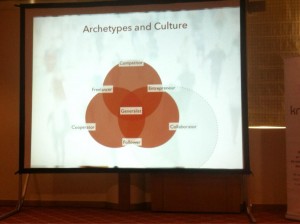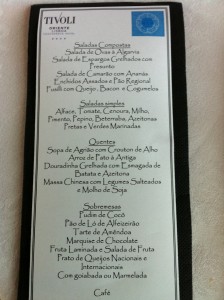It took me a while to think about what I was going to say to the first full house KMUK has enjoyed for many years as I detect a palpable sense of excitement among the organisers.
Over the last couple of months I’ve been at Social Business events in Lisbon and London and came away feeling that the phenomenal adoption of collaborative social technologies and the clever use of Big Data has the propensity to fuel the resurgence of Knowledge Management.
We live in a world now where: Philips have the ability to log when any light bulb is being switched on and where; testimonials and consumer recommendations (on sites such as Trip Advisor) are the most trusted form of advertising & marketing; the art of sales is about a long tail engagement (consumers publicly telling family and friends what they’ve done and bought); and in effect, performance improvements come from making the invisible visible. All of these characteristics are likely to be found in a knowledge driven organisation.
Its reaffirmed in my mind: the importance of personal contact and facilitation; a need to be clear about why this critical knowledge ‘stuff’ is being captured and harvested; the importance of the right environment (and culture); and the idea of focusing on Ambassadors / Champions especially in global organisations.
the address
Good morning and welcome to the 10th anniversary event of KMUK. I said in the event flyer that I thought there was a stellar speaker line up with MAKE winners and some of the most influential thought leaders in the Knowledge Management space.
Over the next two days you are also going to have the opportunity of spending time with your peers as well as engaging directly with the speakers in the breaks and at the speaker clinics. And for the first time at KMUK the opening Keynote will have two carefully selected respondents.
It promises to be an interesting and stimulating two days: a number of the speakers will be using KMUK as the launch event for ideas, techniques and groundbreaking partnerships.
There is a twitter hash tag KMUK and Ark will be consolidating all of the tweets into a Storify record of the event.
Back to 2003
It being the 10th anniversary, I want to take you back a decade to the last KM Europe held in the UK at Alexandra Palace in 2003. Many people wrote blog posts about the keynote speech. I’ve selected a few quotes:
- …much of our current knowledge management practice is being locked into content management,
- …we are all engaged in a constant process of sense-making, where we try to find the best available explanation for something based on previous experience rather than the perfect logical solution. This is why he favours “narrative management” and story-telling as more appropriate vehicles for knowledge sharing than replicating best practice
- Conventional Knowledge Management has been too concerned with codifying explicit knowledge to aid replication, and with using categorisation (where we construct data around a framework), rather than exploration (where we construct frameworks around the data).
- innovation springs from emergence in complex systems, which means that we should be “managing for serendipity” by creating the conditions for creative innovation to emerge.
Again it’s worth returning to what was said back in 2003
- Too many people focus on managing knowledge rather than managing the channels through which knowledge flows. Just connecting or linking people can be a major knowledge management activity.
- … new tools now allow us to telescope five to six years of social networking down to five or six weeks, albeit with less density. Such programmes aim to create linkages where no linkage currently exists and are particularly useful during re-organisations and activities such as merger and acquisition.
- Attempts to engineer a network through design and allocation of staff to groups generally fail as they create artificial relationships that are not sustainable. Self selecting social network stimulation replicates, but in a shorted timescale, a natural process.
At that event horizontal km software vendors were much in evidence as they had been at all of the previous ones.
- Intranets were into their 2nd wave, people were struggling with enterprise search, decentralized publishing and SharePoint, some 2 years on from its launch, was competing with other document management systems and had yet to achieve the ubiquitous enterprise status it has today wherein in many in senior management say ‘we do km, we have SharePoint!’
- Android Inc was being founded and would become the largest mobile operating system inside a decade mirroring the dramatic growth of mobile smart phones.
- WordPress too was launched bringing self-publishing to the masses. It has recently been the beneficiary of an exodus from Tumblr following its acquisition by Yahoo – more of them and Marissa Meyer later.
- IBM were undertaking a 72 hours ValuesJam, for all employees in a debate about the very nature of the company and what it stood for.
- The 2nd Gurteeen Knowledge Management conference was taking place – its themes: ‘knowledge, networking and communities’. And it was all about conversation. One delegate’s key soundbite: “Knowledge is not something you keep in your head, it’s a behaviour”’
- In 2003 the book Knowledge Asset Management was published. It recognized critical knowledge as an asset to be nurtured.
- Also that year my colleagues and I at Sparknow were using the traditional techniques of a postcard as a prompt to ask delegates at KM Europe about their work spaces and what the new virtual world would do to the traditional office and ways of working. We collected but never published a number of very insightful comments.
when space matters – looking at workspace
So since in my view wor kspace (physical and virtual) plays a critical role in all things Knowledge Management we decided to repeat the exercise a decade on and asked the speakers if they’d take first stab at answering the same half a dozen questions.
kspace (physical and virtual) plays a critical role in all things Knowledge Management we decided to repeat the exercise a decade on and asked the speakers if they’d take first stab at answering the same half a dozen questions.
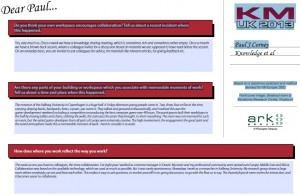 I’ve collated their responses and contrasted them with some of those we had in 2002/3. The report is available on line along with the conference proceedings. It would be great if you could add to the body of work by filling in your own and putting them up on the wall.
I’ve collated their responses and contrasted them with some of those we had in 2002/3. The report is available on line along with the conference proceedings. It would be great if you could add to the body of work by filling in your own and putting them up on the wall.
KMUK 2013
Social vs. Knowledge Management
You are going to hear a lot about community, collaboration, culture and change. Also context, champions, conversation and communication. Your challenge over the next two days is to work out when and how to harness the array of social tools and use them in context/ tandem with other initiatives. Here’s a really interesting and recent extract from a Gartner blog post:
- Knowledge management is what the company tells me I need to know based on what they think is important.
- Social media is how my peers show me what they think is important based on their experience in a way that I can judge for myself
Knowledge should be like water — free flowing and permeating down and across your organization filling the cracks, floating good ideas to the top, lifting everyone in the organization.
Knowledge management, in practice, reflects a hierarchical view of knowledge to match the hierarchical view of the organization. Knowledge may originate anywhere in the organization, but under knowledge management it is channeled and gathered together in a knowledge base (cistern) where it is distributed based on a predefined set of channels, processes and protocols.
Social media looks chaotic in comparison. There is no predefined index, no prequalified knowledge creators, no knowledge managers, ostensibly little to no structure.
Where an organization has a roof, gutters and cistern to capture knowledge, a social media organization has no roof allowing the rain to fall directly into the house collecting in puddles wherever they happen to form. That can be quite messy and organizations abhor a mess.
Last week I was an invited guest at the Dachis Group’s Social Business Summit. A month previously I’d been helping to run a similar event in Lisbon at which social vendors presented their wares to a fictitious company.
Both events threw up so many crossover points with Knowledge Management and I shared a number of the tweets on the #KMUK twitter site. Here are a few sound bites to reflect on as you are thinking about it
- Social interaction accounts for 50% of the performance of the team We are now consuming more content generated by each other than generated by media companies
- Brands are a natural community of people identifying with each other, with a shared set of belief /Advocates are the ‘tribe’ who need motivation/incentives. – Employees are the most important and need empowering to do so
- social helps to drive savings where knowledge management comes in’
The two that stood out for me and reappear as a theme this afternoon
- A dead sale is one that’s not shared. People must be incentivized to share.
- Who can add value to the data? Data will tend to migrate to where it will be most effective.
Paul J Corney
For KMUK June 2013

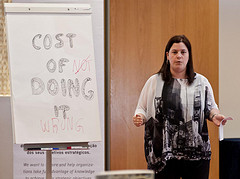
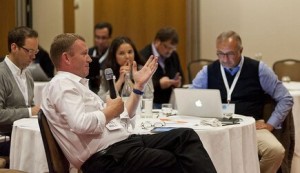
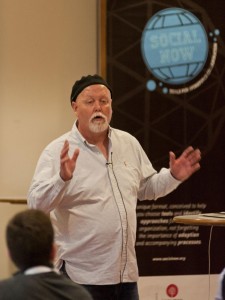
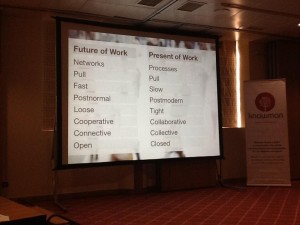
 RT
RT 